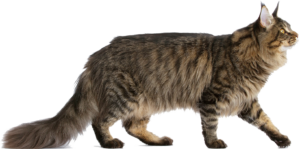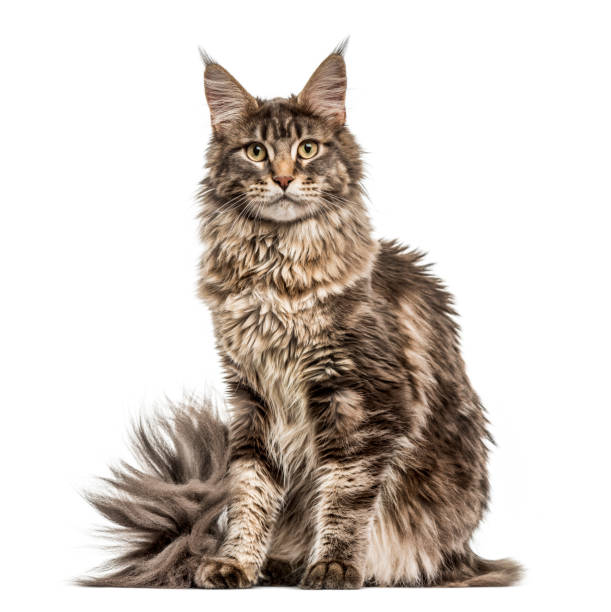
ORIGIN
United States
HEIGHT
25-40 cm
LIFE SPAN
9-15 years
ADULT WEIGHT
3.5-8 kg
TEMPERAMENT
Gregarious, kind, intelligent, family oriented
GROUP
Large Longhair
OTHER NAMES
Maine Cat, Coon Cat, American Coon Cat
Personality and Temperament
Bold features, a thick, luxurious coat, and an incredibly friendly personality set the Maine Coon cat apart from the rest. These gorgeous cats love to play, but they enjoy taking time out for a well-earned nap when the mood strikes. Often, Maine Coon cats snuggle up next to their favorite people, which can be quite helpful on chilly evenings!
The Main Coon’s purr is warmly expressive, and it’s often loud enough to be heard from several feet away. Their vocalizations are surprisingly quiet for such big cats, but their vocabularies can be extensive, with a range of chirps and meows.
Playful and active, Bengal cats are excellent pets. Quite a bit less standoffish then some other wildcat hybrids, these incredible cats enjoy affection and develop close bonds with their family members. Although they might be up for a cuddle now and then, Bengal cats are anything but couch potatoes. This highly active breed needs a lot of daily activity and play to thrive.
Bengal cats love to climb and like their wild, jungle-dwelling cousins, they seek high vantage points from which to view their domain. Curious, they like to be in the middle of everything and they enjoy learning how things work.

Maine Coon Care
Essential Care Strategies for Your Maine Coon
HISTORY
As you might have guessed, the Maine Coon cat is a native of the state of Maine. Endemic to the United States of America, this breed probably originated in the 1850s, when long-haired cats were brought to America and mated with local short-haired cats. The result was a hearty, healthy, large cat with incredible hunting prowess; a heavy, shaggy coat; and a long, flowing tail.
1. Grooming
The Maine Coon has a thick, dense double coat with a silky soft undercoat. The coat needs thorough brushing at least two to three times a week to prevent matting.
Some Maine Coons might need daily brushing. Your cat will appreciate the regular grooming sessions and view them as an additional opportunity to bond.
2. Nutrition
Maine Coon cats have no special nutritional needs. However, it is worth noting that these large cats need a high-protein diet, and their daily caloric needs can be far higher than that of a smaller cat.
We recommend feeding your Maine Coon cat a fresh diet or offering a high-quality commercial brand that lists real fish or meat as the number one ingredient.
3. Exercise
Maine Coon cats are playful, but they are equally fond of lounging. Too much inactivity can lead to obesity over time. Encourage your Maine Coon cat to play using feather wands and fishing pole toys, tossed balls and fuzzy mice, and laser pointers (never shine the light in their eyes and prevent frustration by giving them a real toy to "catch" at the end of the game).
If possible, consider teaching your Maine Coon to walk on a leash and secure harness. The more activity your cat gets, the better their health is likely to be for the long-term.
4. Health
Maine Coon cats are generally very healthy. Most pedigreed cats have certain genetically linked health conditions known in the breed. For the Maine Coon, the most common include feline hypertrophic cardiomyopathy, hip dysplasia, and spinal muscular atrophy. Reputable breeders take care to screen adult cats prior to breeding them, which minimizes the likelihood that they will pass these problems on to their kittens.
Some Bengal kittens are born with flat-chested kitten syndrome. This is normally caught by the breeder and with treatment, these cats can go on to live healthy lives.
